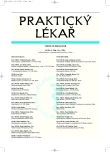-
Články
- Vzdělávání
- Časopisy
Top články
Nové číslo
- Témata
- Kongresy
- Videa
- Podcasty
Nové podcasty
Reklama- Kariéra
Doporučené pozice
Reklama- Praxe
Psychofarmaka v ordinaci praktického lékaře podávaná v těhotenství a v laktaci
Prescription of psychotropic drugs during pregnancy and breast-feeding in the general practitioner’s surgery.
The decision to prescribe drugs to treat patients with mental health problems is based on animal studies, case-reports, reports of adverse effects, registries of pregnant patients, or epidemiological studies. On the one hand, one must consider the consequences to the fetus or neonate of drug administration and, on the other hand, the negative impact of an untreated mental health disorder on the mother or child must be taken into account. Psychotherapy or electroconvulsive treatment are alternative options to pharmacotherapy. The most serious side-effects of drug treatment to the fetus and newborn include congenital malformations, intoxication and withdrawal syndromes and long-term neurobehavioral problems. Withdrawal of the maintenance medication can result in an increased risk of relapse, unfavorable course and overall outcome of the mother’s illness. With untreated illness, the fetus and child can be endangered through insufficient maternal care. The general practitioner frequently sees patients with mental health problems in his/her surgery, and commonly prescribes psychotropic drugs. Therefore it is essential to become familiar with the principles of drug treatment in pregnancy and breast-feeding, to know the risks and alternatives. This review summarizes data on the relationship between pregnancy and psychotic disorders, depression, bipolar disorder, and anxiety disorders. Teratogenesis is discussed in detail, as are other negative consequences of the various psychotropics, antipsychotics, antidepressants, mood stabilizers, anxiolytics, and hypnotics on the fetus and neonate during pregnancy and breast-feeding. Basic principles of drug treatment of mental disorders during pregnancy and breast-feeding are reviewed.
Key words:
pregnancy, breast-feeding, mental health problems, psychotropics, congenital malformations
Autoři: P. Mohr
Působiště autorů: Ředitel: prof. MUDr. Cyril Höschl, DrSc., FRCPsych ; 3. lékařská fakulta Universita Karlova v Praze ; Centrum neuropsychiatrických studií, Praha ; Psychiatrické centrum Praha
Vyšlo v časopise: Prakt. Lék. 2007; 87(1): 11-16
Kategorie: Přehledy
Souhrn
Rozhodování o farmakoterapii duševních poruch v těhotenství a laktaci vychází z animálních studií, kazuistik, hlášení o nežádoucích účincích, registrů gravidních, anebo epidemiologických studií. V terapii zvažujeme na jedné straně následky, které může podání léků mít pro plod či kojence a na straně druhé negativní důsledky neléčené duševní poruchy pro ženu, anebo dítě. Alternativou farmakoterapie může být psychoterapie, anebo elektrokonvulzivní léčba. Mezi nejzávažnější následky podávání léků pro plod a kojence patří kongenitální malformace, neonatální toxicita, intoxikace a abstinenční symptomy a dlouhodobé neurobehaviorální následky. Vysazení dlouhodobé medikace znamená pro matku zvýšené riziko relapsu nebo zhoršení průběhu a celkového výsledného stavu onemocnění. V případě neléčené duševní poruchy jsou plod a dítě ohroženi především nedostatečnou péčí ze strany matky. Praktický lékař se ve své ordinaci často setkává s nemocnými s psychiatrickými diagnózami, běžně předepisuje psychofarmaka. Proto je důležitá základní orientace v problematice farmakoterapie duševních poruch v těhotenství a laktaci, znát možná rizika a alternativy. Přehled přináší informace o vztahu gravidity s psychózami, depresí, bipolární poruchou a úzkostnými poruchami. Detailně jsou diskutovány teratogenní a další negativní účinky jednotlivých skupin psychofarmak, antipsychotik, antidepresiv, stabilizátorů nálady, anxiolytik a hypnotik na plod a kojence v průběhu těhotenství a kojení. V přehledu jsou rovněž uvedeny základní principy farmakoterapie duševních poruch v těhotenství a laktaci.
Klíčová slova:
gravidita, laktace, duševní poruchy, psychofarmaka, kongenitální malformace
Štítky
Praktické lékařství pro děti a dorost Praktické lékařství pro dospělé
Článek vyšel v časopisePraktický lékař
Nejčtenější tento týden
2007 Číslo 1- Alergie na antibiotika u žen s infekcemi močových cest − poznatky z průřezové studie z USA
- Není statin jako statin aneb praktický přehled rozdílů jednotlivých molekul
- Horní limit denní dávky vitaminu D: Jaké množství je ještě bezpečné?
- Magnosolv a jeho využití v neurologii
- Metamizol jako analgetikum první volby: kdy, pro koho, jak a proč?
-
Všechny články tohoto čísla
- Psychofarmaka v ordinaci praktického lékaře podávaná v těhotenství a v laktaci
- Současné možnosti diagnostiky a léčby Wilsonovy choroby
- Diagnostika a léčba revmatoidní artritidy – některé nové aspekty
- Biochemické molekulární mechanismy srdečního selhání 2. část
- Rezistence k antibiotikům u sedmi druhů invazivních bakterií, sledovaných v rámci EARSS v České republice v letech 2000–2006
- Dětské úrazy a možnosti prevence
- Chronická renální insuficience v primární péči
- Naše zkušenosti s léčením akutní mesenteriální ischemie
- Kraniofaryngeom u 79letého muže
- Foramen ovale patens jako příčina paradoxní embolizace u potápěčů. Možnosti screeningu, terapeutická a preventivní doporučení
- Autonomní selhání způsobené recidivujícími hypoglykémiemi, jeho klinické hodnocení a terapie
- Praktický lékař
- Archiv čísel
- Aktuální číslo
- Informace o časopisu
Nejčtenější v tomto čísle- Chronická renální insuficience v primární péči
- Kraniofaryngeom u 79letého muže
- Současné možnosti diagnostiky a léčby Wilsonovy choroby
- Autonomní selhání způsobené recidivujícími hypoglykémiemi, jeho klinické hodnocení a terapie
Kurzy
Zvyšte si kvalifikaci online z pohodlí domova
Autoři: prof. MUDr. Vladimír Palička, CSc., Dr.h.c., doc. MUDr. Václav Vyskočil, Ph.D., MUDr. Petr Kasalický, CSc., MUDr. Jan Rosa, Ing. Pavel Havlík, Ing. Jan Adam, Hana Hejnová, DiS., Jana Křenková
Autoři: MUDr. Irena Krčmová, CSc.
Autoři: MDDr. Eleonóra Ivančová, PhD., MHA
Autoři: prof. MUDr. Eva Kubala Havrdová, DrSc.
Všechny kurzyPřihlášení#ADS_BOTTOM_SCRIPTS#Zapomenuté hesloZadejte e-mailovou adresu, se kterou jste vytvářel(a) účet, budou Vám na ni zaslány informace k nastavení nového hesla.
- Vzdělávání



